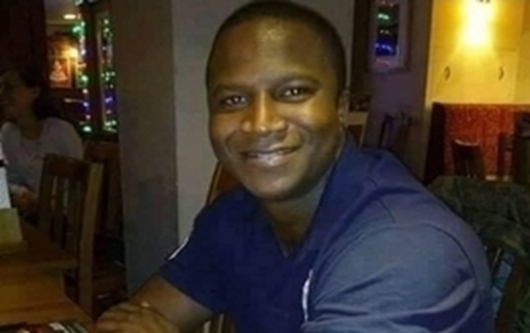Sheku Bayoh’s Death Shows Scotland Is No Progressive Haven
An unarmed Black man dies in police custody. Eight years later, a public inquiry finally begins.
by Jonathon Shafi
6 February 2023

Last week, the independent public inquiry set up to examine the events surrounding the death of Sheku Bayoh in police custody reconvened. Bayoh, who came to Scotland from Sierra Leone as a teenager, died aged 31 in Kirkcaldy, on Scotland’s east coast, after being forcibly restrained by officers.
The case has become one of the most high profile of its kind in Scotland. Bayoh’s family – backed by a coalition of supporters including anti-racist campaigns and the Scottish Trade Union Congress – managed to force a public inquiry to investigate whether race was a factor in his death, even after Scotland’s most senior legal officer decided no action should be taken against police personnel involved in the incident.
On 3 May 2015, officers in Kirkcaldy responded to calls in relation to a Black man acting erratically with a knife. Arriving on the scene, a minimum of five officers used pepper spray, CS spray and batons to subdue Bayoh, who was unarmed at this point. He was handcuffed, with restraints applied to his knees and ankles. At some point, he lost consciousness and died. After his death, Bayoh’s body was found to have a broken rib and was “covered in lacerations [and] bruising,” along with cuts to the inside of his mouth, haemorrhages in both eyes and shin wounds. The family’s legal representatives say Bayoh died of “positional asphyxia, after being held down by several police officers.”
In the immediate aftermath, police leaked selectively curated information to the media. At the time, the Bayoh family’s lawyer, human rights campaigner Aamer Anwar, condemned the “double standard” at play. “Repeatedly the family are bullied, patronised and expected to remain silent while there is a deliberate attempt to criminalise Sheku Bayoh and justify his death,” he told the press.
Police Scotland have relied on several highly racialised stereotypes in their account of Bayoh’s death – a pattern that has continued in testimony provided to the inquiry. Officers admitted to drawing comparisons between Bayoh and the killer of British soldier Lee Rigby, and to terrorism, raising issues around Islamophobia. Bayoh was also described as appearing “superhuman.” In the words of one officer: “He was massive, the biggest male I have ever seen […] I’ve never seen a more frightening, crazy, man in my life”, while another described him as a “frightening, crazy man”. A rhetorical shield around police actions was arranged by emphasising the uniquely dangerous traits which supposedly marked Bayoh out as an extreme threat on that May morning.
This, of course, isn’t an isolated example. It’s part of a pattern of delegitimising criticisms of policing institutions, particularly when it comes to their violent interactions with minoritised populations. Negative physical generalisations are often used to generate stigma and suspicion, and to encourage acceptance of police narratives. Numerous cases illustrating how Black people are presented as “innately different” demonstrate this – the term “superhuman” is a recurring theme in police brutality cases, from Kirkcaldy to Los Angeles. That very phrase was deployed as a key line in the defence of the 15 officers who beat Rodney King in 1991. It was used after the murder of Laquan McDonald, who was shot 16 times in Chicago in 2014, and again in 2017 when an unarmed Black man was shot dead by police in Tulsa.
The point is to attribute specific qualities to Black people on the receiving end of such policing, as a means to rationalise the degree of force used. Some of these themes are being brought to the fore in the inquiry, the aim of which is to “examine the events surrounding the death of Sheku Bayoh, the subsequent investigation and whether race was a factor.” This is the first inquiry of its kind to take place in Scotland. That makes it difficult to determine what the impact of any outcome will be. But as we know from the Stephen Lawrence inquiry, even if claims of institutional racism are accepted, this will by no means lead to structural change.
In truth, Scotland is no exception when it comes to racism in the UK, whatever its broader reputation for progressiveness. A recent Runnymede Trust report showed that “a third of Black and Asian groups in Scotland consistently experience racial discrimination and that a slightly higher number consider racial discrimination to be a widespread issue.” The research further revealed that the majority of people who experience racial discrimination don’t report it to any authority, suggesting an epidemic of hidden racial abuse.
The Bayoh family, and particularly Sheku’s sister, Kadi Johnson, have endured extensive racism throughout their public fight for some justice. Johnson has received abusive and intimidating messages, while Anwar has been on the receiving end of a death threat. Lord Bracadale, who chairs the public inquiry, had to raise the issue in his opening remarks of the second stage of the inquiry in November last year.
While Police Scotland debuted a new ‘Policing Together’ strategy last year to “drive equality and inclusion”, their attempts to sidestep accountability for Bayoh’s death are telling – and suggest further obstacles to achieving justice will emerge even if race is officially judged to have been a factor in the tragedy. The fight Bayoh’s family have undergone to have their case heard exposes the reality behind Scotland’s progressive facade. Jargon around “representation,” “diversity” and “intersectionality” is in wide use, yes – but serious anti-racism means taking action. Solidarity with Sheku Bayoh and all who loved him is what’s needed now.
Jonathon Shafi is a columnist for Novara Media and socialist campaigner, based in Glasgow. He writes the weekly newsletter ‘Independence Captured’.


